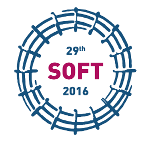Speaker
Kyung-Min Kim
(National Fusion Research Institute)
Description
It is so important that the bonding technology between tungsten and dissimilar metals for the PFC of ITER and DEMO. The development of tungsten brazing technology was first launched for the KSTAR PFC.
Flat type tungsten block was brazed on CuCrZr in vacuum at a temperature of 980 °C for 30 minutes using silver free brazing alloy. A OFHC-copper was used as an interlayer between tungsten and CuCuZr because of its low yield strength and low elastic modulus. The brazing filler is a 0.05 mm thick-plate made of the Ni-Cu-Mn alloy.
Tungsten brazed mock-ups with a swirl tube were tested at an electron beam facility, KoHLT-EB(Korea heat load test facility) in KAERI. The high heat flux test was performed for tungsten brazed mock-ups with a swirl and smooth tube under heat flux of about 5 MW/m22 up to 2,000 cycles and about 8 MW/m22 up to 2,000 cycles. The ultrasonic test was performed to inspect the bonding between tungsten and CuCrZr, and the microstructures of the bonded region were analysed by scanning electron microscopy after the heat flux test.
The test results show there are no delaminations or failures at the bonding joints during and after all the heat flux test and the swirl tape is better for cooling the surface of tungsten mockups under high heat flux.
In this study, we present the manufacturing process of tungsten brazed mock-ups with a swirl tube in detail and the results of the high heat flux test.
Co-authors
D.W. Lee
(Korea Atomic Energy Research Institute, Daejeon, South Korea)
H.C. Kim
(National Fusion Research Institute, Daejeon, South Korea)
H.J. Ahn
(National Fusion Research Institute, Daejeon, South Korea)
H.K. Park
(National Fusion Research Institute, Daejeon, South Korea)
H.T. Kim
(National Fusion Research Institute, Daejeon, South Korea)
J.H. Song
(National Fusion Research Institute, Daejeon, South Korea)
Kyung-Min Kim
(National Fusion Research Institute, Daejeon, South Korea)
S.H. Park
(National Fusion Research Institute, Daejeon, South Korea)
S.K. Kim
(Korea Atomic Energy Research Institute, Daejeon, South Korea)

